2015 STATE OF WORLD POPULATION REPORT PACIFIC MEDIA RELEASE
UNFPA Pacific, Fiji (December 4, 2015) - Actions to promote equitable development which benefits women, men, boys and girls alike can build resilience and cushion the shock when disasters strike or conflicts break out.

Speaking at the media launch of the State of World Population 2015 Report media launch in Suva this morning (December 4, 2015), UNFPA Pacific Sub-Regional Office Director and Representative Dr Laurent Zessler emphasized the importance of bridging the humanitarian response and development.
"National development plans designed and implemented in a way that promotes gender equality and meets everyone's needs, including the sexual and reproductive health needs of women and adolescent girls, can lay the foundation for rapid recovery and post-conflict, resilient development," Dr Laurent Zessler said.
Entitled Shelter from the storm: a transformative agenda for women and girls in a crisis-prone world, the State of World Population calls for four transformative agenda for humanitarian assistance:
§ Meet all acute need: Access to sexual and reproductive health services can save lives: this service can no longer be an afterthought;
§ Increase investment in mitigation: Ensuring prevention and preparedness for future crises;
§ Invest in resilience: Fundamental for resilience of governments, institutions, communities and individuals is inclusive and equitable development; and
§ Bridge the gap between humanitarian assistance and development.
"UNFPA sees this transformative agenda as the way towards a world where women and girls are no longer disadvantaged in multiple ways, but become equally empowered to realize their full potential-before, during and after a crisis," Dr Zessler said.
Every year, the United Nations Population Fund or the UNFPA releases a report on the State of World Population. This year, the State of World Population report focuses on how humanitarian situations or fragile settings reinforces circumstances that perpetuate gender inequality. This worsens situations for women who already, in normal times, are already marginalized and discriminated against.
The State of World Population calls on governments and assistance groups everywhere to move women's health and rights, and in particular women's sexual and reproductive health, from the backseat to the front seat of the world's humanitarian agenda.
The State of World Population calls for better shelter to help women and adolescent girls weather the storms of disasters and conflicts all around us today. Critical basic services like maternal health and contraception are necessary to save women's lives. Good sexual and reproductive health information and services, and lived reproductive rights will enable adolescents to make a safe and healthy transition to adulthood, with their rights and dignity intact.
Globally, 507 women and adolescent girls die daily, every day, during pregnancy and childbirth in crises like earthquakes and conflicts. One hundred million people need humanitarian assistance this year. More than 25 million of them are women and adolescent girls of childbearing age. Nearly 60 million people have been uprooted by conflict-the largest number since the end of the Second World War.
"The risks and vulnerabilities for women and girls in these situations are disproportionately high," Dr Zessler said.
"Women's health and rights are under attack when natural disasters topple hospitals, when conflicts undermine rule of law and heighten vulnerabilities to rape, when an epidemic makes it unsafe for expectant mothers to find the services of a midwife.
"The services and support available to them in crises are disproportionately low. Without the usual protection of family and community, women and adolescent girls can easily become victims of sexual violence, unintended pregnancies and sexually transmitted infections."

For more information, please contact Ariela Zibiah on +679 3230711 or +679 8682097 or email: zibiah@unfpa.org

